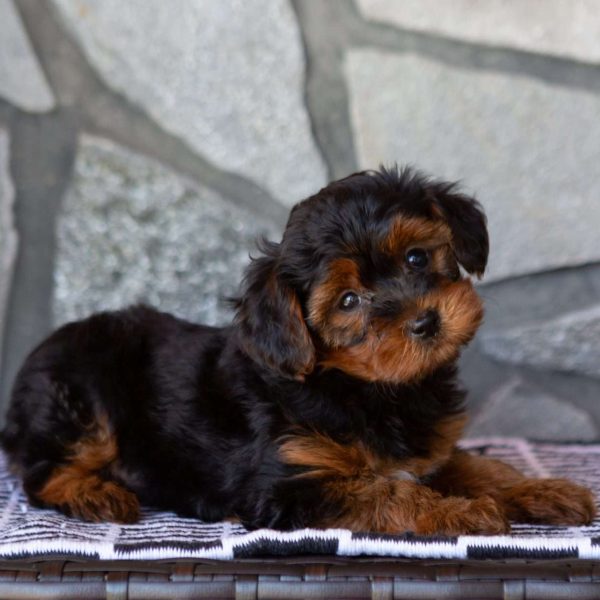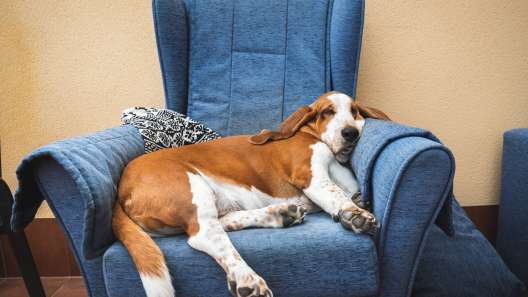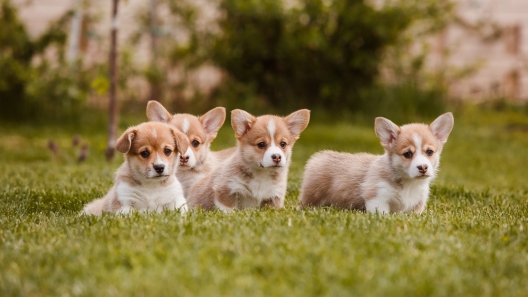
-
Activity Level:
moderate
-
Shedding Level:
low
-
Grooming Level:
high
-
Trainability:
high
-
Good for Novice Owners:
high
-
Adaptability:
high
-
Kid/Pet Friendly:
often
-
Prey Drive:
high
-
Watchdog:
very alert
- Average Size: Small
- Average Lifespan: 10-15 years
Yorkie Poo Dog Breed Information
Overview
Temperament
Adaptability
Health
Owner Experience
Grooming
Activity Level
Size
Life Span
Did You Know?
The Yorkie poo is a cross between a Yorkshire Terrier and Mini Poodle. These tiny-but-mighty canines originated in the United States. Well-socialized, these rambunctious little pups tend to be friendly, smart, sweet, and somewhat mischievous if given the opportunity.
Although they are not recognized by the American Kennel Club, they are recognized by other canine clubs and dog registries. The American Canine Hybrid Club, International Designer Canine Registry, Designer Dog Kennel Club, and Designer Breed Registry all recognize the Yorkie poo.
Yorkie poos are loving and loyal little dogs that love nothing more than being around their favorite humans and receiving attention from them. Well-socialized, they get along with children and other dogs. Despite being small, they can have a high prey drive, so may need extra training and socialization around other pets.
Because they are so small, especially as puppies, Yorkiepoos can be easily injured by accidental rough play or falls that can be common with young children. Because of this, they are generally recommended for families with older children. Regardless, it’s important for interactions between young kids and puppies to be closely supervised.
Although well-socialized Yorkie poos tend to warm up to strangers once introduced, they can be initially wary and prone to barking a lot. It’s a good idea to train your dog to stop barking early on to keep this to alerting and not a nuisance. It’s also important to socialize and train your Yorkie poo early and throughout their life to ensure they do not develop aggressive tendencies or undesirable behaviors.
Yorkipoos are highly adaptable little dogs. As long as they get enough daily attention and exercise, they can adapt well to apartment living as well as larger homes. Because of their prey drive and urge to chase, it’s recommended that they are only let off leash in securely fenced areas.
As with any dog breed, they are sensitive to heat. As a small dog breed, they are also sensitive to the cold. You may want to gear up with some winter dog products to protect their paws and help keep them warm while out on walks during the winter.
These little dogs also bond very closely with their families and are happiest when they are with their favorite humans. As such, they do not like to spend long periods of time alone. They can also be prone to developing separation anxiety if you do not work with them on it early on.
Although mixed-breed dogs can sometimes be healthier than purebred dogs, it’s not a guarantee and the health of the parents matters. A mix can inherit the health conditions common to one, both, or neither of their parent breeds. Potential health concerns to be aware of in Yorkie poos can include epilepsy, hypothyroidism, diabetes, Addison’s disease, Cushing’s disease, atopic dermatitis, eye anomalies, von Willebrand’s disease, Legg-Calve-Perthes, and patellar luxation.
Good breeding practices make a big difference in the health of Yorkie poo puppies and reputable breeders will screen their dogs to avoid passing preventable issues to puppies. Make sure you ask about the health and genetic history of both parents. You can also ask about any relevant health tests or clearances that have been done.
Yorkie poos tend to be intelligent little dogs that pick up on things quickly and are eager to please. However, they can also be stubborn and may use their cute faces to push boundaries and try to get away with things. Although this can be a challenge for first-time dog owners, Yorkie poos still tend to be a good fit for all experience levels.
As long as training is kept consistent, clear, and focused on positive reward and praise, a Yorkie poo will often strive to meet and exceed expectations. There are plenty of benefits of puppy training classes, including socialization, so they can be a great idea even if you don’t necessarily need them for help with training.
Also, small dogs have small bladders, especially when they are tiny puppies. This can make potty training a Yorkie poo difficult. Having plenty of patience, creating good routines, and other house training tips can help you and your Yorkiepoo make it through potty training with your sanities intact.
Thanks to the Poodle in the mix, Yorkie poos are low shedders. Although they are somewhat hypoallergenic and it’s rare that they create dander, their coat still needs to be brushed every day to remove tangles and prevent matting. They will only need to be bathed periodically as needed outside of professional grooming, which is recommended every 6-8 weeks to keep their coat healthy, manageable, and looking great.
In addition to coat care, you will also need to take care of your Yorkie poo’s nails, ears, and teeth. The groomer can help take care of some of this during regular visits, but you will still need to do some maintenance tasks at home. Cutting your dog’s nails once or twice monthly is usually enough to keep them from growing too long and causing issues.
It’s also a good idea to check your dog’s ears weekly to make sure they are clean, dry, and free of debris or irritation. You can also carefully clean your dog’s ears as needed. This can help prevent ear infections. Dental care for dogs early and consistently throughout their lives is also extremely important.
Gum disease in dogs is common and a serious health issue, and a Yorkie poo is more prone to developing it as a small dog breed. You can help prevent it and other painful dental diseases later in life by implementing a good dental care routine. Daily brushing or use of an enzyme toothpaste for dogs, in addition to cleanings at the vet when needed, is a good start.
Although Yorkie poos may have bursts of high energy when they play, they tend to sit in a lower to more moderate activity range. Daily walks plus some playtime throughout the day are usually enough for these little dogs. But, they will likely be up for more activity if you are, especially if it means spending more time with you.
They can be athletic and take on a lot of activities once they are finished growing, but they are also small dogs who can tire and become dehydrated quickly. So, make sure you are keeping an eye on them to ensure they are not overheating or overexerting themselves trying to keep up with you. If you’re going on outdoor adventures, it’s not a bad idea to consider a dog backpack to make carrying them easier if they need a break.
Fully-grown Yorkie poos usually stand 7-15 inches tall and weigh 5-15 pounds on average.
Yorkie poos generally live for 10-15 years on average.
A Yorkie poo is also sometimes called Yorkie-Poo, Yorkiepoo, Yorkipoo, Yorkiedoodle, Yo-yopoo, and Yoodle.









